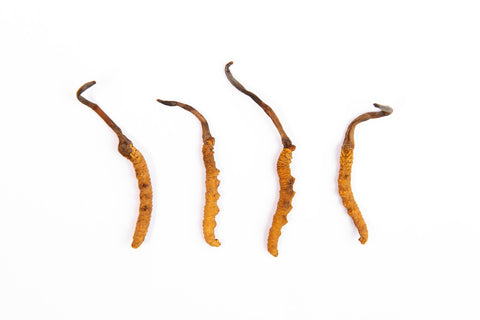Magic Mushrooms
AUTHOR - DR. DAVID JACK

If you’ve been watching Gwyneth Paltrow’s series on Netflix which launched earlier this year you might have caught the episode on psychedelics, in which several of her team members were packed off to Jamaica on a psilocybin retreat.
This magic mushroom, along with ayahuasca, has become one of the most popular psychedelic experiences that have hit the mainstream in the last few years.
Combined with an increased awareness of alternative and holistic medicine, the popularity of these clandestine fungi in recent years has driven a surge in interest in more conventional mushroom-based supplements.
Given the illicit status of psilocybin mushrooms in many countries, such retreats are limited to a few Caribbean and Central American countries, but the potent effects of such mushrooms are believed to be typical of the healing benefits that many other mushroom species may possess. Indeed, in recent years the power of mushrooms has been increasingly recognised in western medicine.
Mushrooms are abundant in nature, with over 10,000 varieties having been identified. There is even a scientific speciality dedicated to their study, mycology. Of those identified, only a fraction are edible, with many being toxic for human consumption.
Of the edible forms, a number have been used for centuries in various cultures for their diverse medicinal effects. From ancient Greece to 2nd-century Chinese medicine, these nutrient-packed plants are really having a moment.
Excluding psilocybin, which would be classified as psychedelic, a number of mushroom varieties are believed to have prominent effects on the central nervous system in humans.
Certain varieties are believed to be able to improve mood, improve alertness and enhance aspects of memory, as well as a multitude of other health benefits including heart health and immune function.
Significant research is still needed to prove many of these claims but the recent surge in usage of more unusual varieties of mushrooms in supplements has fuelled a renaissance in mycological research. In this article, I wanted to share with you some of my top mushrooms picks from the edible varieties.
Cordyceps Mushrooms

Probably the most grizzly sounding mushroom on our list is the Cordyceps. These mushrooms are parasitic fungi that grow on the larvae of insects and are usually collected still attached to their host.
When their spores attach, the Cordyceps develop long stems that grow outside the body of the larvae and eventually the mushroom tissue replaces much of that of the larvae. The Cordyceps are then collected, dried and consumed. These unusual mushrooms have been used for centuries in Chinese medicine to reduce tiredness and as an aphrodisiac.
Thankfully nowadays, most Cordyceps available for consumption are grown in labs, without the need for insect larvae, so can be considered a vegan food.
There have been several small scale studies looking at the effects of Cordyceps highlighting potential benefits including improved exercise tolerance, reduced fatigue as well as a potent antioxidant and anti-inflammatory properties.
Some animal studies have shown that supplementation with Cordyceps improves erectile function, memory and anti-ageing effects.
Lion’s Mane Mushrooms

Lion’s Mane or Hericium Erinaceus is a type of mushroom that resembles a lions mane as it grows. Found on the surfaces of hardwoods such as American Beech in Europe, the Americas and Asia, it forms long, dangling spines that give it a ‘hairy’ appearance.
Lion’s Mane has been used in Chinese medicine as a digestive aid for several centuries. It is thought to reduce ulcers and improve immune function, as well as benefiting mental wellbeing and memory. In recent years, there has been some interest in the possible neuroprotective effect of lion’s mane in the prevention of Alzheimer’s disease, which has been hinted at by some animal studies.
Similarly, other research in animals has shown that Lion’s Mane may reduce anxiety and depression, as well as improving hippocampal function (the part of the brain associated with short term memory and other functions
The reason for these possible effects are thought to be the high concentration of compounds called hericenones and erinacines, which have been shown to stimulate the growth and maturation (differentiation) of nerve cells
Reishi Mushrooms

Traditional Chinese medicine has utilised Reishi mushrooms for several centuries. Traditionally thought to boost heart health and immunity, some early studies have shown their consumption may improve symptoms of chronic fatigue and anxiety. Reishi mushrooms are rich in compounds including triterpenoids, polysaccharides and peptidoglycans, which are thought to be responsible for their reported benefits.
As with many of the other mushrooms on this list, the hard scientific evidence for these is at an early stage so more evidence is required before any firm claims can be made. A recent review in the journal of advanced experiments in medicine and biology reported on the use of Reishi in skin conditions such as eczema and in wound healing, which showed a significant improvement presumed to be linked to their high concentration of antioxidant and anti-inflammatory compounds.
Maitake Mushrooms

Maitake mushrooms are indigenous to Japan, China and North America and generally grow at the bases of hardwood trees such as elm, maple and oak. Their medicinal properties have been celebrated for thousands of years and they are said to promote longevity and general health. Their rich antioxidant and micronutrient content are believed to improve heart health and early studies have hinted they may help balance cholesterol and blood sugar levels. They are low in calories, fat and cholesterol-free.
Chaga Mushrooms

Inonotus obliquus or Chaga mushrooms are probably one of the ugliest looking mushrooms on our list. Sometimes described as birch canker (i.e. an open wound or sore on a birch tree), their health benefits seem to outweigh their unfortunate appearance. Forming what looks like craggy coral fragments on the bark of birch trees in North America, Siberia and Northern Europe, Chaga mushrooms have traditionally been consumed for their reported immune-boosting and anti-inflammatory benefits.
To date, no human studies have been undertaken to look at these reported benefits but some early animal studies have reported positive effects on blood sugar, cholesterol and gut inflammation
Turkey Tail Mushrooms

Believed to be an immune boosting superfood for many years, the turkey tail mushroom (or Trametes Versicolor) has been used as a natural medicine throughout the world for many years. Containing an abundance of flavonoid antioxidants and phenols, this fungus is known to have strong anti-inflammatory effects and has been found to contain high levels of molecules known as polysaccharopeptide. These compounds are known to enhance immune function and function as prebiotics in the gut.
Shiitake Mushrooms

A commonly consumed mushroom throughout both the East and the West, Shiitake mushrooms not only have a pleasant umami favour, which has made them a popular ingredient in Japanese cuisine, but they are also extremely rich in micronutrients including B vitamins and trace metals. Shiitake mushrooms are also rich in beta-glucans, eritadenine and sterols, all of which are known to reduce cholesterol absorption and inhibit cholesterol production. Some early studies have also shown promise in treating eczema with these mushrooms.
An early human study looking at the effects of Shiitake on the immune system found that consumption of just two of these mushrooms per day had a significant effect on markers of immunity, and reduced inflammatory markers.
Conclusion
The world of mushrooms is ripe for research. Having played a central role in Chinese medicine for many years, the diverse attributes of the many species of mushrooms is just beginning to be explored. Much research is needed before the benefits can be fully understood but it remains a particularly interesting field.
Useful Resources
Effects of Cordyceps
Memory and anti-ageing effects
Neuroprotective effect
Improving hippocampal function
Growth and maturation (differentiation) of nerve cells
Chronic fatigue and anxiety
High concentration of antioxidant and anti-inflammatory compounds
Health benefits
Positive effects on blood sugar
Enhance immune function
Prebiotics in the gut
Reduce cholesterol absorption and inhibit cholesterol production
Immunity and reduced inflammatory markers

